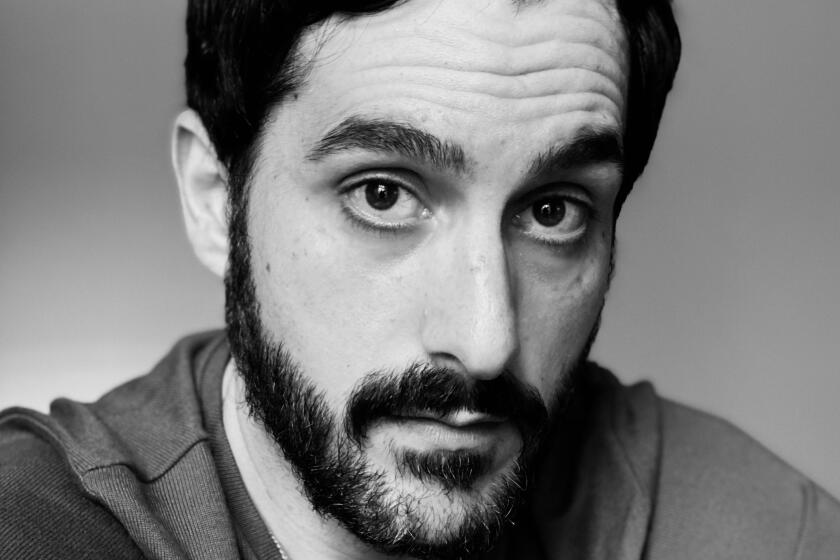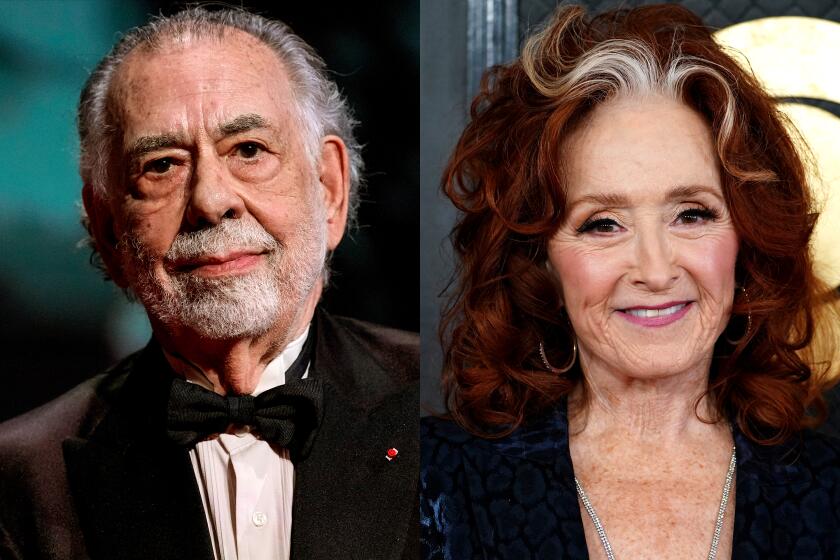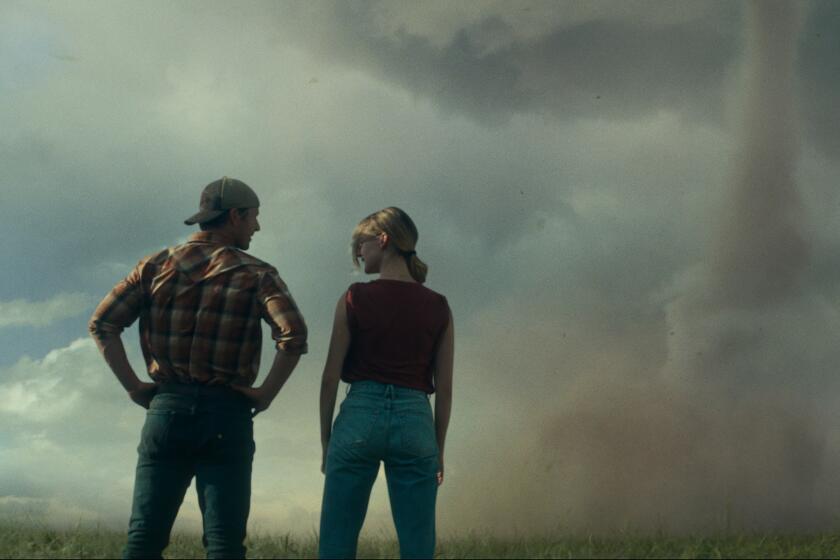Hey, Chili, Meet a Real Producer
As Chili Palmer in “Get Shorty,” John Travolta has a running gag in which he reckons that producing movies is a cakewalk compared to mob business. “I don’t think a producer has to know much,” says Chili, and perhaps nobody appreciates the irony of the joke better than producer Lawrence Bender.
After all, it was “Pulp Fiction,” produced by Bender, that restored Travolta’s wilting career. While Quentin Tarantino was instrumental in convincing Travolta to tackle the role of burger-eating hit man Vincent Vega, Bender’s oversight as the kind of hands-on producer who has nurtured numerous highly regarded, low-budget, independent films helped make “Pulp” possible.
Trust us, say his friends and those who work with him--this is one producer who knows a lot.
“On someone else’s film, if you have a question, you might ask the producer’s assistant,” says fellow producer and frequent associate Richard Gladstein. “On Lawrence’s productions, you ask Lawrence.”
But knowledge isn’t everything; Bender keenly talks about the intuitive aspects of filmmaking. Indeed, for a producer who has guided such raw, violent and controversial films as Boaz Yakin’s “Fresh,” the current “White Man’s Burden” by writer-director Desmond Nakano and Tarantino’s first film, “Reservoir Dogs,” Bender is no tough guy. Unlike many Hollywood deal-makers who live by putting up hard exteriors, Bender takes pleasure in self-reflection--and reflecting on how far he feels he has yet to go.
Yet it’s amazing how far he has come. A struggling actor-producer with few prospects just five years ago, Bender found himself in the spring of ’94 on the Cannes Film Festival dais next to Tarantino picking up the Palme d’Or for “Pulp,” and then early last year as a best picture Oscar nominee for the same film.
Now, with “White Man’s Burden” and “Four Rooms” (with segments written and directed by Tarantino, Allison Anders, Alexandre Rockwell and Robert Rodriguez) in release, and the Rodriguez-Tarantino heist-with-vampires movie “From Dusk Till Dawn” rolling in on Jan. 19, Bender is expectantly seeing what life after “Pulp Fiction” is like.
So far this season, it has fallen far short of “Pulp’s” remarkable success, which included more than $200 million in worldwide theatrical grosses and an enormous video-rental order of more than 700,000 units. “Burden,” Nakano’s speculation on an America where blacks are the ruling majority and whites are the poor minority, opened to mixed reviews and tepid box office. Delayed from October, “Four Rooms” opened Christmas Day to mostly negative reviews.
Bender, who recently turned 39, insists that he wants life after “Pulp” to be about more than filmmaking, but he is intensely concerned that each film he produces is handled (“from the final script draft to the TV ad campaign”) with care and taste.
Still, he and his friends know that the “Pulp” phenomenon is virtually impossible to match or surpass. “Films like that don’t normally make that kind of money,” says Yakin, “and for people to expect even half of that success again is a mistake. Getting a hit like that is both a blessing and a curse, in a way.”
If it’s a curse, Bender doesn’t mind having it. He says he’s heard people say, “ ‘Oh, that Lawrence, he’s just lucky that he hooked up with Quentin,’ and yeah, I am lucky. But we all are.”
But consider his own definition of the producer’s key role: “It’s to protect the filmmaker, to let the filmmaker do the best possible work.” It is Bender’s reputation for lending the protecting, helping hand that has made him a leading light among American independent film producers.
That reputation was gently parodied recently by the Hollywood Reporter in a piece that coyly summed up differing tastes between studio and independent producers. When it came down to whom studio honchos wanted to be, the answer was Louis B. Mayer. For independents, the answer was Bender.
In a sense, though, Bender doesn’t quite believe that his success will maintain itself. It’s why he continues to drive a well-worn, 10-year-old Toyota compact and live in an apartment that he is just now getting around to furnishing (with a little help from his girlfriend, Kim Green, who owns a furniture store).
“I think about getting a really nice car,” he says, “but the image I get in my head is such a sickening cliche. I’ve only been seeing any money out of all my work for the past two years, and when you’ve been as poor as I’ve been, you don’t think money is always going to be around.”
The poverty was somewhat self-imposed. The Bronx-born Bender grew up in Cherry Hill, N.J., “which was all-white and anti-Semitic, so I’d hear comments about me like, ‘He’s a good kid for a Jew.’ I have some idea of what it means to be discriminated against, though not as a distinct minority of color.”
He figures that his concern for social issues, which attracted him to films like “Fresh” and “White Man’s Burden,” stems from his parents. His father was a professor in the philosophy of history, and later switched to psychoanalysis. His mother was one of the few white teachers in the predominantly African American Camden, N.J., school district, and during the Vietnam War, encouraged her son to go to anti-war marches.
Choosing the University of Maine for civil engineering studies because it was “near good skiing,” Bender graduated near the top of his class and was wooed by major corporations. But he had already begun drifting away from that lucrative career; at various times, he considered going to chef school, opening a pottery store and devoting his life to karate. The university’s dance department needed male dancers, and with his dancer girlfriend egging him on, he started down a path that would lead to dancing with “Fame” choreographer Louis Falco’s troupe during the heyday of New York dance in the ‘80s.
“Dancing felt like destiny,” Bender says. “I was the type of person who held his emotions inside, and dancing let them out. It was also an incredible time to be a dancer--we had around us Twyla Tharp, Mark Morris, Merce Cunningham. . . .”
Too many dance-related injuries forced Bender to consider acting, which led, among other things, to performing in a special staging of “A Midsummer Night’s Dream” at Ellen Burstyn’s mansion with a cast including Burstyn and Christopher Walken (to hook up again with Bender on “Pulp”). Los Angeles seemed to have more acting opportunities, so he moved here in 1985--only to find no work.
“It got so bad that I figured with $50 in the bank, I could live in my car since it was warm. Actors here are treated like a life form lower than an amoeba, and sleeping on friends’ sofas and hearing how everyone was out of work really got to me.”
Some production jobs on student films at the American Film Institute taught him the ropes of working on a set, but the real baptism by fire was producing director friend Scott Spiegel’s direct-to-video horror flick “Intruder.”
That experience led to nothing, and Bender was pretty discouraged with the movie business when he met Tarantino at Spiegel’s Labor Day party in 1990. Bender had already read and loved Tarantino’s “True Romance,” and soon after found Tarantino handing him a final draft of something called “Reservoir Dogs.”
“We’d do it really cheap, I’d play Nice Guy Eddie [played in the film by Chris Penn] and it would be cool,” Bender says. “But when the script got to Harvey Keitel through my acting class teacher, and Harvey actually left a message on my phone machine wanting to be in the movie, that was it. I had two conflicting feelings. One was total excitement--the movie would get made. The other was sadness--I knew right then that I wouldn’t act in it, and that my career was suddenly in front of me, as a producer.”
“Dogs” not only established Tarantino’s worldwide cult following, but a company of actors and artists to whom Bender swears loyalty, including cinematographer Andrzej Sekula, editor Sally Menke and designer David Wasco. It led to the formation of Bender’s and Tarantino’s A Band Apart Productions and a steady relationship with Miramax.
A Band Apart is now expanding into commercial production, with the company’s first ad, starring Michael Jordan touting Gatorade, set to air during the Super Bowl.
By his own confession, Bender’s twin concerns for challenging subjects and low budgets haven’t made life--even one with Oscar nominations--easy. He is currently struggling to raise the $5 million to $6 million needed for Yakin’s urban drama “Flying,” and running a tightly budgeted ship has meant clashes with motion picture unions.
Though he says he worked easily with craft unions in New York during the shooting of “Fresh,” Bender has faced shutdowns and threats of pickets during such L.A. shoots as “Burden” and “Dusk.”
“A low-budget filmmaker in L.A. just has to pray that the unions don’t catch you,” he notes. “But it shouldn’t have to be this way. I’ve been talking with producers and union people about this solution: Any movie under $3 million should be waived from any union requirements, and with movies above $3 million up to $10 million, let’s work out a deferment situation. Younger union members and those who’ve worked on low-budget films seem to like this idea.”
So will Bender lead this next indie revolution?
“I don’t know, now that I’m thinking of pulling back for awhile, so I can have a life. I haven’t found happiness in filmmaking--not that I’m not incredibly grateful. But real happiness is having a life full of experiences.”
More to Read
Only good movies
Get the Indie Focus newsletter, Mark Olsen's weekly guide to the world of cinema.
You may occasionally receive promotional content from the Los Angeles Times.






